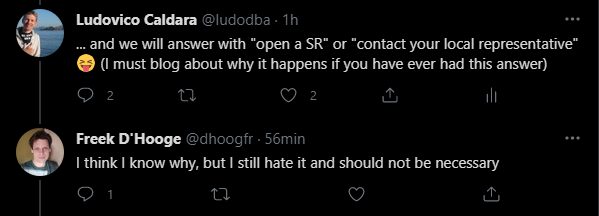If you attend Oracle-related events or if you are active on Twitter or other social medias used by technologists, you might know many of us Product Managers directly. If it is the case, you know that we are in general very easy to reach and always happy to help.
When you contact us directly, however, sometimes we answer “Please open a SR for that“. Somehow irritating, huh? “We had chats and drinks together at conferences and now this bureaucracy?” This is understandable. Who likes opening SRs after all? Isn’t just easier to forward that e-mail internally and get the answer first hand?
This is something that happened to me as well in the past when I was not working for Oracle yet, and that still happens with me now (the answer coming from me, as PM).
Why? The first answer is “it depends on the question“. If it is anything that we can answer directly, we will probably do it.
It might be a question about a specific feature: “Does product X support Y?”, “can you add this feature in your product?” or a known problem for which the PM already knows the bug (in that case is just a matter of looking up the bug number), or anything that is relatively easy to answer: “What are the best practices for X?”, “Do you have a paper explaining that?”, “Does this bug have a fix already?”
But there is a plethora of questions for which we need more information.
“I try this, but it does not work“. “I get this error and I think it is a bug“. “I have THIS performance problem“.
This is when I’d personally ask to open a SR most of the times (unless I have a quick answer to give). And there are a few reasons:
Data protection
Oracle takes data protection very seriously. Oracle employees are trained to deal with potentially sensitive data and cannot forward customer information via e-mail. That could be exposed or forwarded to the wrong recipients by mistake, etc. We don’t ask for TFA collections or logs via e-mail (even if sometimes customers send them to us anyway…).
There are special privileges required to access customer SRs, that’s the only secure way we provide to transfer logs and protected information. The files uploaded into the SRs must be accessed through a specific application. All the checkouts and downloads are tracked. When we need to forward customer information internally, we just specify the SR number and let our colleagues access the information themselves. Sometimes we use SRs just as placeholder to exchange data with customers, without having a support engineer working on it.
This is the single most important point that somehow makes the other points irrelevant. But still the remaining ones are good points.
Important pieces in the discussion do not get lost
The answer does not always come from first-hand… it might take 3-4 hops (sometimes more) and analysis, comments, explanations, discussions.
E-mail is not a good tool for this. Long threads can split and include just part of the audience (the “don’t reply to all” effect). Attachments are deleted when replying instead of forwarding… and pieces get lost.
This is where you would use a Jira, or a trouble ticketing system. Guess which is the one that Oracle uses for its customers? 🙂
MOS has internal views to dig into TFA logs (that’s why it is a good idea to provide one, whenever it might be relevant), and all the attachments, comments and internal discussions are centralized there. But we need a SR to add information to!
Win-win: knowledge base, feedback, continuous improvement
If you discover something new from a technical discussion, what do you do? Do you share it or do you keep it for yourself? MOS is part of our knowledge base and it is a good idea to store important discussions in it. Support engineers can find solutions in SRs with similar cases. It is a good opportunity for the support engineer him/herself to be involved in one more interesting discussion, so next time he/she might have the answer on top of the fingers.
To conclude, think about it as a win-win. You give us interesting problems that might help improving the product, and you get a Guardian Angel on your SR for free 😉
—
Ludo

